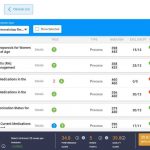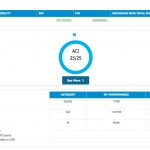This year’s ACR/ARHP Annual Meeting, which takes place Nov. 3–8 in San Diego, features several opportunities to learn more about the ACR’s Rheumatology Informatics System for Effectiveness (RISE) Registry, and the data and tools it offers rheumatologists. For the first time, RISE data will be presented at the Annual Meeting by rheumatologists outside of the ACR’s RISE Research and Publications Subcommittee.
RISE 101
Free to ACR members, RISE was started in 2014 to help providers track and report quality measures under the Physician Quality Reporting System. Today, RISE allows rheumatologists to prepare for and meet reporting requirements under MACRA, the Medicare and CHIP Reauthorization Act of 2015. Those using RISE will report under MACRA’s MIPS pathway, the Merit-Based Incentive Payment System, which bases provider reimbursement on performance in four categories: quality, advancing care information, clinical practice improvement activities and cost.
Since March 2017, the ACR has also accepted requests from physician-scientists, industry researchers and others who wish to use RISE data. To date, about a dozen projects have been accepted, approved or completed.1
“Having some of these projects presented at the Annual Meeting represents a big step forward for the ACR,” says Tracy Johansson, senior specialist, Registry Analytics for the ACR. “It is a valuable opportunity to share with the rheumatology community the potential of RISE data to answer important and pressing clinical questions.”
RISE Data Preview
What follows is a preview of the RISE data to be presented at this fall’s Annual Meeting, and some of the ways in which the registry’s data are being utilized.
Analysis of Provider-to-Provider Variability in the Use of Biologics: Data from the Rheumatology Informatics System for Effectiveness Registry (poster)
On Sunday, Nov. 5, from 9–11 a.m., Doug White, MD, chair of the ACR Committee on Rheumatologic Care, will present data on how he has used RISE to better understand how rheumatologists around the country are using biologics.
“Since biologics are the major driver of the cost of care for rheumatoid arthritis patients, we thought it would be interesting to see the distribution of biologic use on a provider-by-provider basis in the U.S.,” Dr. White says.
Dr. White shows that biologic use across the country is variable according to provider and geographical distribution. “We hope this kind of information can serve as a preliminary benchmark for rheumatologists seeking to compare their practice habits to those of their peers,” he says.
Although the study does not inform the quality of care patients received, Dr. White says he hopes in the future to incorporate reasonable quality measures into a similar study in order to provide rheumatologists with “a benchmark that pertains to value.” He plans to repeat his analysis with 2017 data, particularly because many more providers are utilizing the RISE Registry than in 2016.



